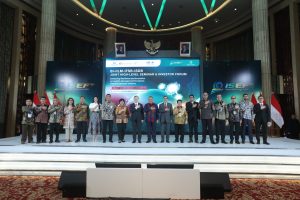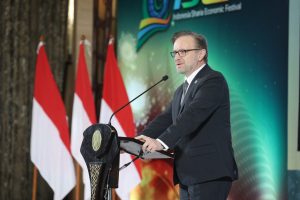
Jakarta, 3 OCTOBER 2025 — The Islamic Financial Services Board (IFSB), in partnership with Bank Indonesia and the International Islamic Liquidity Management Corporation (IILM), successfully convened the annual Joint High-Level Seminar and Investment Forum in Jakarta. The forum, themed “Enhancing Resilience and Innovation in Liquidity Management for Islamic Financial Services Industry,” brought together central bank governors, regulators, financial institution leaders, and industry experts to address critical liquidity management challenges facing the rapidly expanding Islamic finance sector.
In his keynote address, IFSB Secretary-General Dr. Ghiath Shabsigh emphasised the urgent need for monetary authorities to develop robust liquidity management frameworks tailored to Islamic finance. With the industry reaching approximately USD 3.9 trillion globally and approaching systemic importance across MENA, South Asia, and Southeast Asia, Dr. Shabsigh argued that the responsibility for developing effective liquidity solutions rests primarily with policymakers rather than Islamic institutions themselves.
Dr. Shabsigh highlighted the critical role that central banks and governments play in the development of effective liquidity management practices and markets. Central banks play the most important role in money market development through their monetary policy regimes, operational frameworks, and liquidity regulations, while governments shape markets through their debt management practices and instruments.
Given this responsibility, Dr. Shabsigh posed a critical question: as Islamic finance approaches systemic importance globally, will monetary authorities and government adapt their operations to meet these evolving liquidity challenges? If not, Islamic institutions will continue to be forced to innovate within conventional frameworks, creating instruments that reference Islamic contracts but mimic conventional outcomes, potentially undermining proper market development and public trust.
The seminar featured three panel sessions addressing critical industry challenges. IFSB Deputy Secretary-General Abdullah Haron moderated Session 2, “Unleashing the Potential: Digital Technology and Inclusivity,” leading discussions on how digital innovation can transform financial inclusion and liquidity management in Islamic finance. Session 1 examined policy responses to economic trends and resilience strategies, while Session 3, an IILM-led investor forum, focused on sukuk as cross-border liquidity solutions.
With participation from senior officials representing Bank Indonesia, Bank Negara Malaysia, the Islamic Development Bank, the International Monetary Fund, leading Islamic financial institutions, and capital markets, the forum underscored the critical importance of coordinated action among regulators, standard-setters, and market participants to build a resilient liquidity management ecosystem that supports the sustainable growth of Islamic finance globally.

